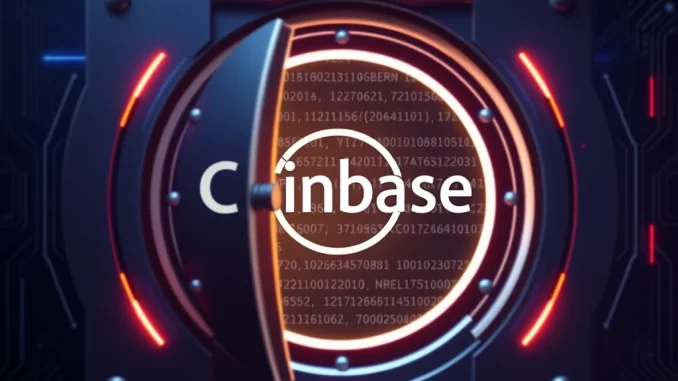
In a groundbreaking move that is sending ripples of excitement through the crypto sphere, Coinbase Institutional has just dropped a bombshell announcement! They’re open-sourcing their cutting-edge multiparty computation (MPC) cryptography library – the very tool they’ve been leveraging to keep their digital asset fortress impenetrable. This isn’t just about sharing code; it’s a bold step towards fostering greater transparency and significantly boosting security standards across the entire cryptocurrency industry. Ready to dive into how this could reshape the future of crypto security? Let’s explore this revolutionary development.
What is a MPC Library and Why is Coinbase Open Sourcing It?
Let’s break down the tech jargon. MPC, or multiparty computation, might sound like something straight out of a sci-fi movie, but it’s a powerful cryptographic technique. Imagine being able to perform computations on data without ever revealing the data itself. That’s essentially what MPC achieves. In the context of crypto security, this is a game-changer.
Think of it like this:
- Distributed Security: Instead of relying on a single point of security, MPC distributes cryptographic keys across multiple parties. This means that no single party holds the entire key, significantly reducing the risk of a single point of failure.
- Enhanced Privacy: MPC allows for secure computations without exposing the underlying data. This is crucial for institutional investors and businesses who need to maintain confidentiality while ensuring secure transactions.
- Improved Key Management: Managing private keys is a constant challenge in crypto. MPC simplifies this by distributing key shares, making key management more robust and less prone to vulnerabilities.
Coinbase Institutional, a major player serving institutional clients in the crypto space, has been using this technology internally to safeguard billions of dollars in digital assets. Now, by open-sourcing their MPC library, they are essentially handing over the keys to a kingdom of enhanced security to the broader crypto community. Why would they do this? It boils down to a commitment to the collective security of the crypto ecosystem. A rising tide lifts all boats, and in this case, improved security for everyone benefits Coinbase and the entire industry.
The Power of Open Source Security in Crypto
Open source isn’t just a buzzword; in the world of cybersecurity, it’s a powerful force for good. When code is open source, it means it’s publicly available for anyone to inspect, audit, and contribute to. This transparency is incredibly beneficial for several reasons, especially when it comes to crypto security:
- Community Audits: With countless eyes reviewing the code, vulnerabilities are more likely to be discovered and patched quickly. This crowdsourced security approach is far more effective than relying on a closed, proprietary system.
- Rapid Innovation: Open source fosters collaboration and innovation. Developers from around the world can contribute to the MPC library, adding new features, improving performance, and strengthening its security.
- Industry-Wide Standards: By making their MPC library open source, Coinbase Institutional is helping to establish higher security standards across the crypto industry. This can lead to more interoperable and secure systems overall.
This move is particularly significant for the institutional crypto space. Large institutions managing vast sums of digital assets require the highest levels of security. By providing a robust, open-source MPC library, Coinbase Institutional is empowering other institutions to enhance their security infrastructure and build more secure crypto solutions.
Multiparty Computation: A Deeper Dive into the Technology
Let’s delve a bit deeper into the mechanics of multiparty computation. At its core, MPC allows multiple parties to jointly compute a function over their inputs while keeping those inputs private. In the context of cryptocurrency, this often translates to secure key management and transaction authorization.
Consider a simplified example:
| Traditional Key Management | MPC-Based Key Management |
|---|---|
| Private key is stored in a single location (e.g., a hardware wallet, server). | Private key is split into multiple shares and distributed across different parties or devices. |
| Single point of failure: If the location is compromised, the key is compromised. | No single point of failure: Compromising one or even several shares does not reveal the entire private key. |
| Higher risk of internal compromise or accidental exposure. | Significantly reduced risk of internal compromise as no single party has full control. |
The beauty of multiparty computation lies in its ability to perform cryptographic operations without ever reconstructing the full private key in one place. This dramatically reduces the attack surface and enhances overall security.
Benefits of Coinbase Institutional’s Open Source MPC Library
The decision by Coinbase Institutional to open source their MPC library unlocks a plethora of benefits for the crypto industry:
- Democratized Security: This powerful security tool is now accessible to everyone, from small startups to large enterprises, leveling the playing field in crypto security.
- Accelerated Innovation: Open sourcing encourages community contributions, leading to faster development and refinement of MPC technology.
- Reduced Development Costs: Companies can leverage this existing, robust library instead of building their own MPC solutions from scratch, saving time and resources.
- Increased Trust and Transparency: Open source code fosters trust as it allows for independent verification and auditing, enhancing the credibility of crypto systems.
- Stronger Industry Collaboration: This initiative promotes collaboration and knowledge sharing within the crypto community, driving collective progress in security.
Looking Ahead: The Future of Crypto Security with MPC
Coinbase Institutional’s move is more than just a PR announcement; it’s a strategic investment in the future of crypto security. By open-sourcing their MPC library, they are contributing to a more secure, transparent, and resilient crypto ecosystem. We can expect to see:
- Wider Adoption of MPC: As awareness and accessibility increase, MPC will likely become a standard security practice in various crypto applications, from wallets to exchanges to custody solutions.
- New MPC-Based Products and Services: Developers will leverage this open-source library to build innovative and secure crypto products and services.
- Enhanced Institutional Adoption: Improved security and transparency will further encourage institutional investors to embrace cryptocurrencies.
Conclusion: A Giant Leap for Crypto Security
Coinbase Institutional’s decision to open source its MPC library is a truly remarkable and generous contribution to the cryptocurrency industry. It’s a powerful testament to the spirit of open collaboration and a significant step towards building a more secure and trustworthy digital asset ecosystem. This move not only strengthens the security posture of individual entities but also fortifies the entire crypto landscape, paving the way for broader adoption and innovation. By unlocking this powerful security tool for the world, Coinbase Institutional is setting a new precedent for industry-wide cooperation and demonstrating a genuine commitment to the long-term success and security of the crypto revolution. This is a win for everyone involved, and we eagerly anticipate the advancements and innovations that will emerge from this groundbreaking initiative.



